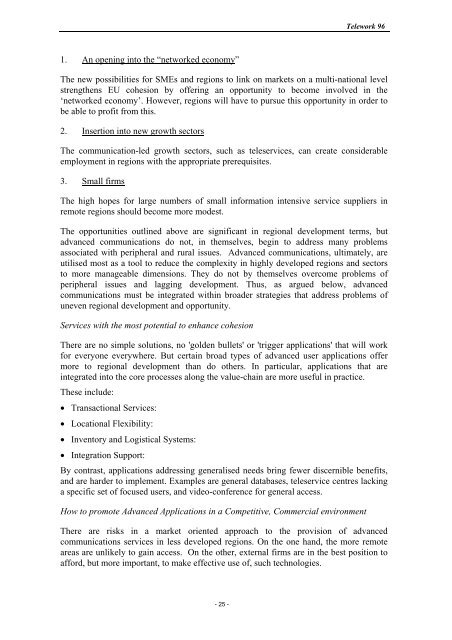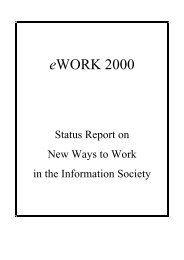1996 - European Telework Week
1996 - European Telework Week
1996 - European Telework Week
- No tags were found...
Create successful ePaper yourself
Turn your PDF publications into a flip-book with our unique Google optimized e-Paper software.
<strong>Telework</strong> 96<br />
1. An opening into the “networked economy”<br />
The new possibilities for SMEs and regions to link on markets on a multi-national level<br />
strengthens EU cohesion by offering an opportunity to become involved in the<br />
‘networked economy’. However, regions will have to pursue this opportunity in order to<br />
be able to profit from this.<br />
2. Insertion into new growth sectors<br />
The communication-led growth sectors, such as teleservices, can create considerable<br />
employment in regions with the appropriate prerequisites.<br />
3. Small firms<br />
The high hopes for large numbers of small information intensive service suppliers in<br />
remote regions should become more modest.<br />
The opportunities outlined above are significant in regional development terms, but<br />
advanced communications do not, in themselves, begin to address many problems<br />
associated with peripheral and rural issues. Advanced communications, ultimately, are<br />
utilised most as a tool to reduce the complexity in highly developed regions and sectors<br />
to more manageable dimensions. They do not by themselves overcome problems of<br />
peripheral issues and lagging development. Thus, as argued below, advanced<br />
communications must be integrated within broader strategies that address problems of<br />
uneven regional development and opportunity.<br />
Services with the most potential to enhance cohesion<br />
There are no simple solutions, no 'golden bullets' or 'trigger applications' that will work<br />
for everyone everywhere. But certain broad types of advanced user applications offer<br />
more to regional development than do others. In particular, applications that are<br />
integrated into the core processes along the value-chain are more useful in practice.<br />
These include:<br />
• Transactional Services:<br />
• Locational Flexibility:<br />
• Inventory and Logistical Systems:<br />
• Integration Support:<br />
By contrast, applications addressing generalised needs bring fewer discernible benefits,<br />
and are harder to implement. Examples are general databases, teleservice centres lacking<br />
a specific set of focused users, and video-conference for general access.<br />
How to promote Advanced Applications in a Competitive, Commercial environment<br />
There are risks in a market oriented approach to the provision of advanced<br />
communications services in less developed regions. On the one hand, the more remote<br />
areas are unlikely to gain access. On the other, external firms are in the best position to<br />
afford, but more important, to make effective use of, such technologies.<br />
- 25 -








